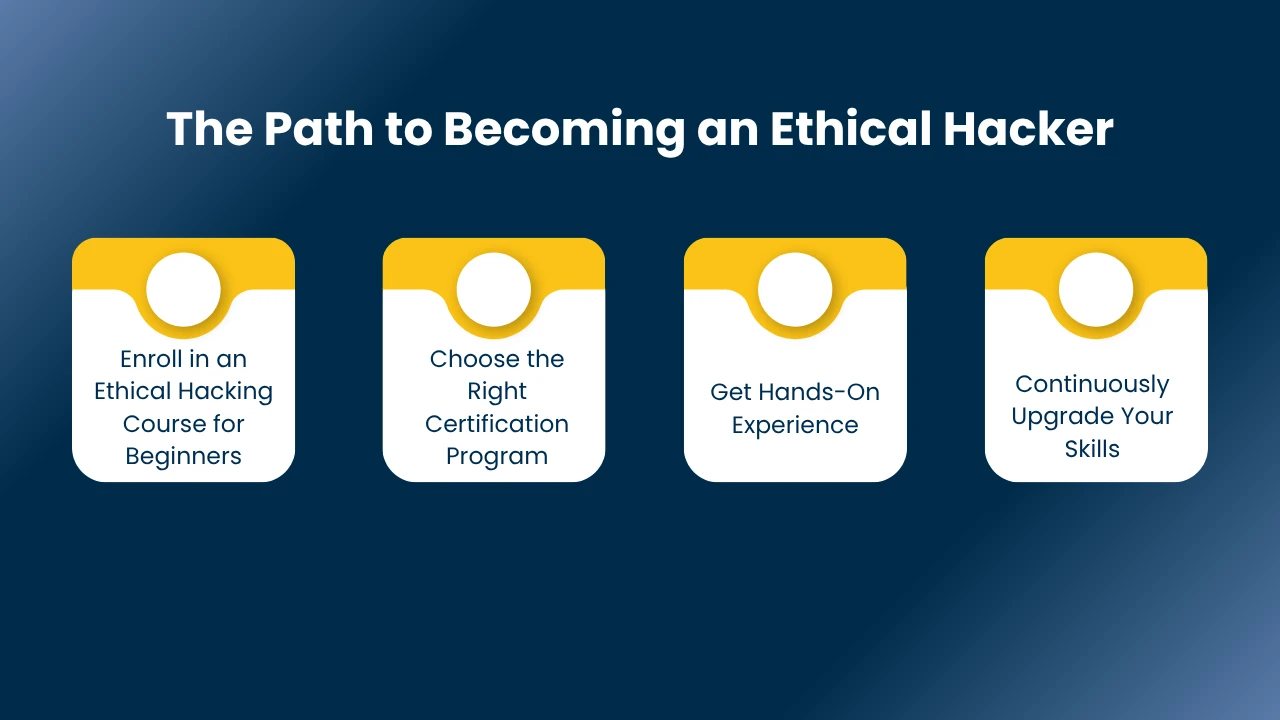In today’s digital age, where the internet and technology form the backbone of businesses, governments, and daily life, cybersecurity has become an essential pillar in protecting sensitive information and infrastructure.
As cyber threats evolve, so does the need for highly skilled professionals who can identify vulnerabilities before malicious hackers can exploit them. Enter ethical hacking—an integral component of modern cybersecurity.
Ethical hackers, also known as white-hat hackers, utilize their expertise to safeguard systems by simulating attacks to discover weaknesses. For anyone considering a career in technology.
Pursuing an ethical hacking course could be your gateway to a highly rewarding and in-demand profession. In this blog, we’ll dive into the role ethical hacking plays in modern cybersecurity and explore why you should consider a career in this exciting and evolving field.
What is Ethical Hacking?
Ethical hacking involves deliberately exploring computer systems, networks, and applications to identify potential security vulnerabilities. The goal is to ensure that potential threats are identified and mitigated before they can be exploited by malicious actors.
Ethical hackers follow legal and authorized procedures and are often employed by companies, governments, and organizations to protect data and infrastructure. Ethical hacking can be thought of as a proactive cybersecurity measure.
While firewalls, encryption, and antivirus software can only provide so much protection, ethical hackers offer an additional layer of security by thinking like cybercriminals. They simulate real-world attacks to assess whether security protocols are effective.
The Growing Importance of Ethical Hacking in Cybersecurity
Cybercrime is on the rise globally, with incidents of ransomware attacks, data breaches, and phishing scams making headlines regularly. As a result, organizations are investing more heavily in cybersecurity measures to protect their data and systems.
According to industry reports, the global cybersecurity market is expected to grow from $173 billion in 2020 to over $270 billion by 2026. Amid this growing demand, ethical hacking has emerged as one of the most sought-after professions in cybersecurity.
A trained ethical hacker can make a tremendous difference by identifying vulnerabilities that are easily overlooked by automated systems.
Key Functions of Ethical Hackers:
- Penetration Testing – Ethical hackers use penetration testing to simulate cyberattacks, providing detailed reports on vulnerabilities and offering solutions to improve security.
- Vulnerability Assessment – Through continuous testing and assessment, ethical hackers identify potential weak points in a system that hackers could exploit.
- Incident Response and Recovery – In the event of a breach, ethical hackers play a critical role in tracing the origin of the attack, understanding its scope, and recommending recovery strategies.
- Enhancing Cyber Resilience – Ethical hackers work proactively to enhance system security before any real threat manifests, making companies more resilient against future attacks.
Why Ethical Hacking is a Promising Career Path
Ethical hacking isn’t just a trend—it’s a rapidly growing field that offers lucrative and fulfilling career opportunities. Here are some reasons why you should consider taking an ethical hacking course and pursuing a career in this field:
1. High Demand for Skilled Professionals
The rise in cybercrime has led to an unprecedented demand for ethical hackers. Pursuing an ethical hacking certification program will equip you with a distinct advantage in the competitive job market.
Employers are looking for professionals who are not only certified but also knowledgeable in the latest hacking techniques and cybersecurity protocols.
A certified ethical hacking professional can command competitive salaries and work in various industries, from finance and healthcare to government agencies and tech companies.
2. Diverse Career Opportunities
Ethical hacking opens the door to a diverse range of career possibilities. After completing an ethical hacking course for beginners, you can advance to roles such as penetration tester, security consultant, information security analyst, or vulnerability assessor.
Many professionals go on to specialize in fields like cloud security, mobile security, or even artificial intelligence in cybersecurity.
A comprehensive ethical hacking certification program can also pave the way for leadership roles, such as Chief Information Security Officer (CISO) or cybersecurity manager, allowing you to take charge of a company’s entire security infrastructure.
3. Continuous Learning and Growth
The cybersecurity landscape is constantly evolving as new technologies emerge and cyber threats become more sophisticated. For individuals who love solving puzzles and learning new skills, a career in ethical hacking provides endless opportunities to grow.
Many ethical hacking training programs, like the best ethical hacking training course available, focus on the latest tools, techniques, and strategies used in the field.
Ethical hackers are always at the forefront of emerging technologies, such as machine learning and artificial intelligence, which are now being integrated into cybersecurity strategies.
4. Contributing to a Safer Digital World
Ethical hackers play a critical role in ensuring the safety of our digital world. By working to protect sensitive data, they contribute to making online interactions safer for individuals and businesses.
In an era where data breaches can result in financial losses, identity theft, and reputational damage, the work of ethical hackers helps to prevent these devastating consequences.
If you’re passionate about making a positive impact, completing a cybersecurity course training focused on ethical hacking is a great way to use your skills for the greater good.
The Path to Becoming an Ethical Hacker
To pursue a career in ethical hacking, you need to have the right training, certification, and hands-on experience. Here’s how you can get started:
1. Enroll in an Ethical Hacking Course for Beginners
If you’re new to the field, start with a foundational ethical hacking course for beginners that covers basic networking concepts, programming skills, and common cybersecurity threats. This will give you the groundwork to move into more advanced training.
2. Choose the Right Certification Program
Certification is essential in the cybersecurity industry. The Certified Ethical Hacker (CEH) certification is one of the most recognized credentials in the field.
A comprehensive ethical hacking certification program will equip you with the necessary skills to identify vulnerabilities and defend against attacks.
Other certifications to consider include Offensive Security Certified Professional (OSCP) and Certified Information Systems Security Professional (CISSP).
3. Get Hands-On Experience
Practical experience is crucial in ethical hacking. Many ethical hacking training programs offer lab environments where students can practice their skills in simulated attack scenarios.
Internships, bug bounty programs, and volunteering on open-source projects are also great ways to gain hands-on experience.
4. Continuously Upgrade Your Skills
As technology evolves, so do hacking techniques. It’s essential to stay informed about the most recent advancements.
Enroll in advanced CybersecTraining courses or specialized programs that dive into areas such as cloud security, mobile security, or ethical hacking for IoT devices.
Conclusion
As digital platforms become more integral to the operations of businesses and governments, the demand for proficient ethical hackers is set to expand significantly.
With the right training, such as an ethical hacking course or a cybersecurity course training, you can join this high-demand field and help protect the systems that keep our world running.
Pursuing an ethical hacking certification training can open doors to a wide range of career opportunities, from penetration tester to CISO.
Whether you’re a tech enthusiast or a problem-solver with a passion for security, becoming certified in ethical hacking allows you to stay at the cutting edge of one of the most important sectors in today’s job market.
If you’re ready to take the first step, explore the best ethical hacking training course for your needs and start your journey toward a fulfilling and impactful career in cybersecurity.








